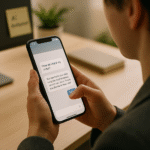Mobile App MVP Development: Build Smart, Launch Fast

Understanding the Concept of a Mobile App MVP
Are you thinking of an app but not sure where to start? An MVP app (minimum viable product) is the simplest version of your app that still solves a real problem. The idea is to build fast, test early, and learn quickly. Big names like Instagram and Airbnb began as tiny MVPs that proved demand before they scaled. At MVPcenter, we help startups validate ideas quickly by building functional MVPs showing whether users want the product.
Why Building an MVP Is Crucial for Your App’s Success
Building an MVP app cuts risk and saves money. Instead of spending months building everything, you release a focused product that tests the market. This gives you honest user feedback, faster time-to-market, and clearer decisions for next steps. Many startups fail because they build something no one wants — about 42% of startups list “no market need” as the top reason. An MVP differs from a prototype (a demo) or a complete product (the finished app). It sits in the middle: real, usable, and focused.
Key Features Every Mobile App MVP Should Include
The essential items needed to address the core issue of the user should form the basic functionality that needs to be included in an MVP app. A straightforward, easy-to-use design should not require an instructional guide. To decide what to include, ask: Is this feature possible to make someone use the app today? If not, save it for later. Let me use the example of an MVP ride-hailing application; it should incorporate: sign-up, request a ride, match with a driver, and simple maps; an e-commerce MVP should include: product listing, cart, checkout, and payment.
The Step-by-Step Process of Developing a Mobile App MVP
- First, start with validation and research. Know your market, meet your potential users, and analyse competitors.
- Next, define the issue and purpose of the application you will develop—describe its worth in a sentence.
- Then, wireframe and draw clickable prototypes, which you can use to test flow, UX, and pre-building.
- To create one, it is necessary to select a scalable application technology like Flutter or React Native to reach Android and iOS within a limited time.
- Little segment, testing, and debugging, then repeat.
- Finally, but not least, it should be distributed to a limited number of people, and the performance should be tracked, and real people should observe what they can do with it.
How Much Does Mobile App MVP Development Cost?
The prices vary according to the region and sophistication. The minimum possible MVP is between low and mid five figures, and a complex feature will add value to the price. The costs will be divided into design, development, Quality assurance, and preliminary maintenance. The cost of hiring freelancers may be cheap and will include the coordination work. MVPcenter, as a company, does everything in an end-to-end way; in most cases, it is faster and has better timelines. To save money, reuse code, choose cross-platform, and practice agile.
Mistakes to Avoid When Developing a Mobile App MVP
Packing too many features during the initial release should be avoided. User validation or testing should not be omitted. Always establish success metrics before launch; otherwise, you will not know whether the MVP was successful. Moreover, basic UI/UX or scalability should not be overlooked either; technical choices may seem easy and cheap now, but may become more expensive.
Measuring the Success of Your MVP
Measures success using basic metrics: retention rate, churn, and user engagement. Monitor the user behavior by using Google Analytics and Firebase. Collect feedback through surveys and in-app prompts, then use that feedback to prioritize the following features. Small iterations based on real data lead to significant improvements over time.
How MVPcenter Helps You Build a Winning MVP
MVPcenter follows a fast, practical process: validate, design, build, and iterate. Our team focuses on quick turnarounds, clear costs, and local support. We bring local market knowledge and on-the-ground support if you’re in Kenya or nearby. Clients often tell us they launched faster and wasted less budget. Contact MVPcenter to turn your app idea into a working MVP in weeks.
Conclusion: Start Small, Scale Smart
An MVP app helps you test ideas without wasting time or money. Start with validation, build only what matters, and use honest user feedback to grow.
Ready to move from idea to launch? Schedule a free consultation with MVPcenter to discuss your MVP and the next steps.
Connect with MVP Center
Ready to take the first step towards unlocking opportunities, realizing goals, and embracing innovation? We're here and eager to connect.




